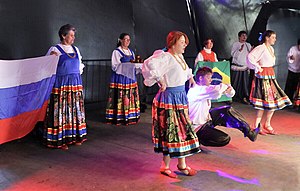 Russian descendants in São Paulo. | |
| Total population | |
|---|---|
| 1,800,000[1] | |
| Regions with significant populations | |
| Rio Grande do Sul, São Paulo, Minas Gerais, Goiás, Paraná, Rio de Janeiro, Santa Catarina and Pernambuco | |
| Languages | |
| Portuguese · Russian | |
| Religion | |
| Judaism · Roman Catholicism · Russian Orthodox | |
| Related ethnic groups | |
| Other Brazilians of Slavic origin, as well as Asian Brazilians, especially Chinese Brazilians |
Russian Brazilians (Portuguese: Russo-brasileiros, Russian: Русские бразильцы Russkiye Brazil'tsy) are Brazilian citizens of full or partial Russian ethnic background or Russian-born people residing in Brazil. The term can also refer to someone with a Brazilian mother and Russian father, or vice versa.
However many are White Russians who arrived in Brazil right after the Russian Civil War in the 1920s. In the 1950s, a wave of Chinese immigrants belonging to the country's ethnic Russian community also arrived in Brazil.[2]
Fernando Lázaro de Barros Basto in Síntese da história da imigração no Brasil (1970) gives a total number of 319,215 immigrants from "Russia" (i.e. the Russian Empire pre-1917 and the Soviet Union post-1917) for the period of 1871 to 1968.[3]
On the other hand, the São Paulo Immigrant Memorial puts the number of said immigrants between 1870 and 1953 at 118,600. Ethnic Russians were only a small portion of this number while the majority were Poles, Ukrainians, Germans, Jews and Balts emigrating from Russian/Soviet territories.[4]
According to information from the Embassy of the Russian Federation in Brazil and from the consulates, 35,000 Russians resided in Brazil in 2018.[5] According to Igor Chnee, author of the book Imigração russo no Brasil, estimated that around 1.8 million descendants of Russian immigrants and refugees (including Russian Germans and Russian Jews) lived in Brazil in the 2010s.[6][7]
The Brazilian states with more descendants include Rio Grande do Sul, São Paulo, Minas Gerais, Goiás and Paraná, in addition to a presence in Rio de Janeiro, Santa Catarina and Pernambuco. In São Paulo, the community founded the Brazilian Russian Association (ARB) which seeks to rescue and preserve the culture of these descendants.[6]
In 2022 onwards, there was an acceleration of Russian couples moving to Brazil. Pregnant women in Russia seeking to give birth to their babies with Russian husbands in Brazil. The main reason reported in surveys among Russian pregnant women was the excellent hospital service in Brazil, considered "humanized" and the rights of children of Russian origin to have Brazilian citizenship, which guarantees them the ability to visit various countries around the world without visas or bans. Under the terms provided for by art. 12 of the Federal Constitution of Brazil, a condition that subsequently allows parents and siblings to request a permanent residence permit in Brazil for family reunion. Under Brazilian law, the baby's parents immediately receive a residence permit in Brazil, and a year later the Russian parents can apply for Brazilian naturalization, as long as they live in Brazil and take a Portuguese test. Among the priority destinations for Russians are Florianópolis and Rio de Janeiro.[8][9]
- ^ "Contra país estagnado, comunidade russa foge e se estabelece no Brasil". R7.com (in Brazilian Portuguese). 2018-06-14. Retrieved 2022-03-01.
- ^ Cite error: The named reference
China Russiawas invoked but never defined (see the help page). - ^ Maria Stella Ferreira Levy. O papel da migração internacional na evolução da população brasileira (1872 to 1972). inRevista de Saúde Pública, volume supl, June 1974.
- ^ Bytsenko, Anastassia (2006). Imigração da Rússia para o Brasil no início do século XX. Visões do Paraíso e do Inferno. (1905-1914) (PDF) (MSc). University of São Paulo.
- ^ Gerais, Universidade Federal de Minas. "Imigração russa influencia cultura brasileira". Universidade Federal de Minas Gerais (in Brazilian Portuguese). Retrieved 2022-03-01.
- ^ a b "Os russos que vieram para o Brasil fugindo da revolução comunista de 1917". BBC News Brasil (in Brazilian Portuguese). Retrieved 2022-03-01.
- ^ "Contra país estagnado, comunidade russa foge e se estabelece no Brasil". R7.com (in Brazilian Portuguese). 2018-06-14. Retrieved 2022-03-01.
- ^ Pregnant women from Russia in Brazil
- ^ Pregnant Russians in Brazil
© MMXXIII Rich X Search. We shall prevail. All rights reserved. Rich X Search
